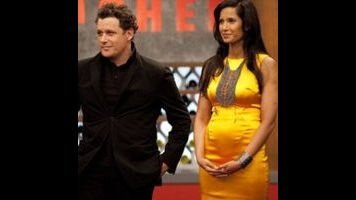Top Chef: "What's Your Constituency?"

Welcome back to the TV Club coverage of Top Chef, which marks the fourth straight season covered by yours truly. I have to confess upfront that I’m feeling some trepidation at the start here: Partly because I felt the quality and chemistry of the competitors on Season Six set the bar awfully high for future seasons, partly because I found myself checking out early on the second run of Top Chef Masters: Season Two (which Emily Withrow covered), and partly because the beginning of every season offers a daunting 17 contestants, the vast majority of whom don’t stand a chance of winning the thing. That means a good 10 weeks of waiting for wheat to be separated from chaff, and trying to summon up outrage over, say, the 9th best chef getting bounced before the 13th best chef.
But while the grind of the early episodes is inevitable—aided by a reality-show formula that certainly isn’t getting any fresher—Top Chef is usually fun in its particulars and Season Seven brings us one major reason for optimism: Eric Ripert, genial culinary superstar and frequent guest in past seasons, has replaced Toby Young as the permanent fourth judge. I’m sure there must be someone who will miss Young’s canned quips and facile observations—and I’ll definitely miss the simmering contempt on Tom’s face whenever Toby opened his mouth—but I think most will agree this is an upgrade. My one concern about Ripert may be the “genial” part: Toby was not afraid to be candid, sometimes to his detriment, and it would be a shame if Ripert became the Paula Abdul of the panel, given more to gentle advise than slash-and-burn critiques. I’ll reserve judgment, but based on tonight’s debut, Ripert at least revealed some sharp, specific insights into how various dish succeeded or failed and that may be enough to compensate for his lack of tartness.
After the standard introduction atop a balcony with Congress as a backdrop, the D.C. Top Chef puts the popular mise en place Quickfire challenge front and center. Had everyone been asked to cook, we’d have gotten the usual mélange of dishes, with some overachievers underachieving and vice versa, and no real sense of who the contenders are this season. Granted, no challenge will tell us everything about how the season is going to shape up, but it stands to reason that those with refined knife skills are very likely to be refined in other areas. And lo, a pair of tough-talking, “alpha-male” types emerge as the persons to beat: Kenny, who zips through three of the four stages in first place (including breaking down four whole chickens at a rate of 10 seconds per), and Angelo, who ultimately wins the Quickfire (and $20,000) with his roasted wing & thigh, curry onion jam, and potato noodles.
Playing the role of hubristic culinary hotshot to the hilt, Angelo also emerges as the early villain of Season Seven, announcing his absurd ambition “to be the first contestant to win every single challenge” and likening his cooking to “an orchestra with flavors.” Still, I prefer brash, overconfident chefs who can cook to the brash, overconfident chefs who don’t know what they’re doing, and there’s the expected abundance of the latter early on. The Elimination challenge asks the chefs to divide into four groups and create individual dishes that most strongly represent where they’re from—all for the 300 or so partygoers (including The Bachelor from The Bachelor!) celebrating cherry blossom season. With the best and worst from each group up for victory and elimination, respectively, the two top Quickfire competitors, Angelo and Kenny, are given the advantage of choosing someone weak to square off against. Tactically, it’s only a minor edge, since nobody knows for sure how good or bad anyone else is yet; on a more personal level, it’s likely to cause friction between the Quickfire champs and the chefs they assume suck the most.
 Keep scrolling for more great stories.
Keep scrolling for more great stories.
